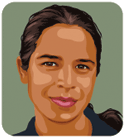I was raised in Caracas, Venezuela, in the 1980s by a single mother who worked in a lab as a physicist and microbiologist. She was too busy doing experiments during the day to pick me up from school, located almost an hour away from her office. So when the last bell rang, I would run outside, climb onto a special schoolbus full of children whose parents were also scientists, and, after wasting another hour in traffic, I would get dropped off at my mom’s lab—the Instituto Venezolano de Investigaciones Científicas (IVIC). This was where I spent all my afternoons, surrounded by centrifuges, water tanks, lab animals, and test tubes. The place was full of fascinating people, many of whom would also spend considerable amounts of time teaching at the Universidad Central de Venezuela in downtown Caracas, going abroad on scholarships or doing research at the Woods Hole Oceanographic Institution here in the United States.
IVIC is the main scientific and research hub of Venezuela, founded in 1959 as an autonomous institution. Its mission, among others, was to nurture new and young Venezuelan talent and advance global scientific inquiry in fields like ecology, biophysics, genetics, immunology, microbiology, and others. One of the many well-known and charismatic researchers working there was my mother’s boss, Reinaldo DiPolo, an expert on neurophysiology and winner of the National Prize in Natural Sciences of Venezuela.
This past August, without a warning, DiPolo received a photocopied letter that terminated his 35 years of work with the IVIC. Twenty-six other leading scientists, all of them formally retired but who continued conducting research and mentoring younger professionals, were asked to go for good.“We can’t keep this situation much longer, from a labor perspective, allowing people who are already retired to continue to enjoy some privileges,” said Ángel Viloria, IVIC’s new director and a supporter of President Hugo Chávez. “That is a benefit that shouldn’t exist. It doesn’t match with our government’s norms.”
But critics of the measure say DiPolo and others were targeted for not being supporters of Chávez and were let go simply for political reasons. IVIC now joins other important but ideologically and financially embattled institutions in the country, such as the Universidad Central de Venezuela, which are being pressured into adopting the party line under President Chávez.
A recent article in Newsweek magazine looks at Venezuela’s talent drain, which has accelerated in the last couple of years and is driving away students, intellectuals and professionals. “The Bolivarian Diaspora” is indeed an apt name for it.
As a man in his late 60s, DiPolo may not have the chance or the opportunities to start a new life or career elsewhere. But he has decided to challenge the decision. If successful it could affect the legacy of almost 30 of Venezuela’s top scientists. Jesse Chacón, the minister of science, technology and intermediary industry has agreed to meet with the disgruntled researchers, but “only to chat about science,” he has declared.
*Ruxandra Guidi is a contributing blogger to americasquarterly.org. She is an independent journalist based in Austin, Texas, and her work can be found at Fonografia Collective (http://fonografiacollective.com).




